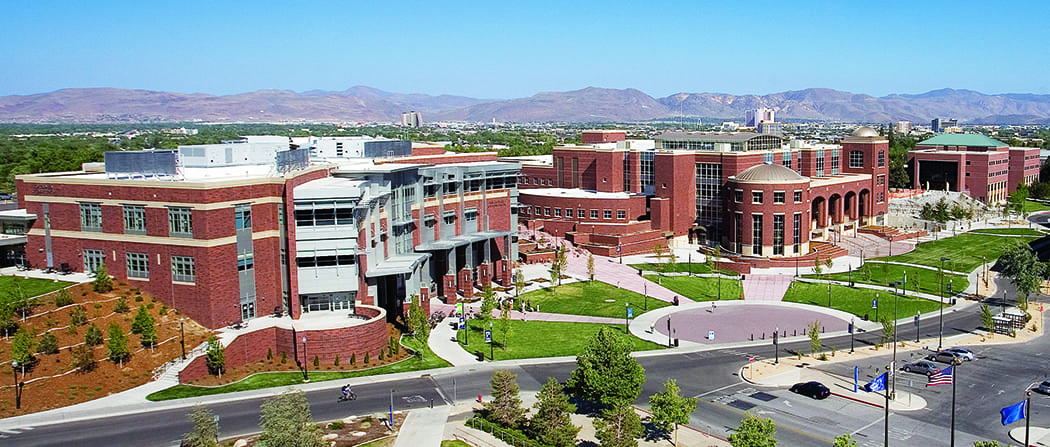University of Nevada, Reno leaders are thrilled at the news that Tesla Motors will construct its gigafactory for the production of lithium-ion batteries in northern Nevada. The Tesla decision has significant implications for the University and its faculty and students, as well as for the region and its economic development.
"The University is tied in very closely with the economic development interests of this state," Marc Johnson, president of the University of Nevada, Reno, said. "We can play a role in welcoming Tesla to this region by providing a broad range of University-trained professionals who will be important to the workforce of Tesla."
The Tesla factory is projected to open in 2017 with full build-out anticipated for 2020. The workforce supplied by the University could come primarily from the College of Business, the College of Science and the College of Engineering for positions such as accountants, human resource professionals, project managers, chemists, and engineers trained in high-tech advanced manufacturing. In addition, other jobs will be created in supporting industries.
"We've added an industry that's in advanced manufacturing, which expands our manufacturing base significantly," Greg Mosier, dean of the College of Business, said of the state's newest industry partnership. "It will help give us a little more even and stable economy as we go through the ups and downs of the economic cycles."
"For businesses that will grow alongside Tesla, we estimate a 2.6 multiplier, which means 1.71 new jobs will be created in other industries," Mosier said.
The Nevada mining industry is one industry in just such a position to grow alongside Tesla.
"Right now world consumption of lithium is pretty constant, we use it in a lot of different ways - for batteries in cameras, phones, computers," Carl Nesbitt, associate professor of mining engineering in the College of Science said. "What the Tesla plant shows is a huge increase in demand for lithium, estimated at perhaps twice the current consumption. It's got to come from somewhere, and Nevada is poised to start producing."
Nevada is the only place in the northern hemisphere that mines and produces lithium, competing with South American mines in Chile and Bolivia. A mine located near Tonopah currently produces lithium carbonate, the precursor product for lithium batteries, and many prospects have been found in northern Nevada, north of Reno, that will be ready for production to meet the increased demand.
"Nevada is number four in the world producing gold and we're a leading producer of silver, but what this allows us to do is put a spotlight on the potential we have for lithium," Nesbitt said. The University's mining-engineering research and education has supported the production of gold and silver in Nevada and is poised to help build the lithium-mining industry to increase lithium production.
In addition to industry collaboration such as this, chemists in the College of Science are exploring the electrochemistry of battery technology and how to improve the chemical reactions that make batteries work.
For example, Assistant Professor Mario Alpuche in the Department of Chemistry has a four-year $650,000 National Science Foundation grant to study the electrochemical properties of semi-conducting nanoparticles and how to control their electrochemical reactions in batteries or things such as corrosion control.
"The department is excited about Tesla coming to the region," Sean Casey, chair of the Chemistry Department, said. "In the advanced power area, there is much fundamental chemistry that still needs to be worked out. That really hits a number of areas of chemistry, including areas such as inorganic chemistry, materials chemistry, surface chemistry and physics."
The College of Science has added some of these advanced manufacturing issues to other graduate and undergraduate curricula, for example, by reviving and modernizing the Polymer Chemistry course and by splitting the Advanced Inorganic Chemistry course into separate graduate and undergraduate levels, where different topics related to these issues can be covered at differing levels.
"We imagine that there will be interest in our graduates as potential employees in the near future, and we are trying to lay a little groundwork there in our curriculum proactively," Casey said.
In the College of Engineering, Alan Fuchs, chair of the Chemical and Materials Engineering Department, is enthusiastic about Tesla's decision.
"This is a wonderful thing for the University," he said. "It gives us opportunities to collaborate with Tesla in a number of research areas as well as undergraduate and graduate programs in the College of Engineering which can work with Tesla in their workforce development.
The College of Engineering has expertise in battery materials development and testing as well as in areas related to mechanical, electrical, environmental and computer science engineering.
"I'm confident engineering will have a central role in collaboration in this industry with our expertise in battery technology, new materials, advanced computing and advanced manufacturing," Manos Maragakis, dean of the College of Engineering, said. "Students will gain technical expertise in this industry through education and internships and there will be new opportunities for our graduates here in Nevada.
"This is a game-changer for economic development in Nevada. I'm very excited to see Tesla bringing their factory to Nevada."












